Introduction: The Mystery Behind Your Cat’s Tongue
Have you ever been peacefully sitting on your couch when your feline friend jumps up beside you and begins to lick your hand or arm? This common behavior often leaves cat owners wondering: why cats lick you? While it might seem like a simple question, the answer reveals fascinating insights into feline psychology and behavior.
As cat owners, we’ve all experienced that distinctive sandpaper sensation when our cats decide to give us a little grooming session. Sometimes it’s gentle and affectionate; other times, it’s persistent to the point of irritation. Understanding why cats lick people isn’t just about satisfying our curiosity—it helps us build stronger bonds with our pets by recognizing what they’re trying to communicate.
In this comprehensive guide, we’ll explore the 5 shocking truths behind why cats lick you, diving deep into the science, psychology, and evolutionary reasons for this common behavior. Whether your cat occasionally licks your hand or seems obsessed with grooming your hair, you’ll discover the meaning of cat licking and what your feline friend is really trying to tell you.
The Science Behind a Cat’s Unique Tongue
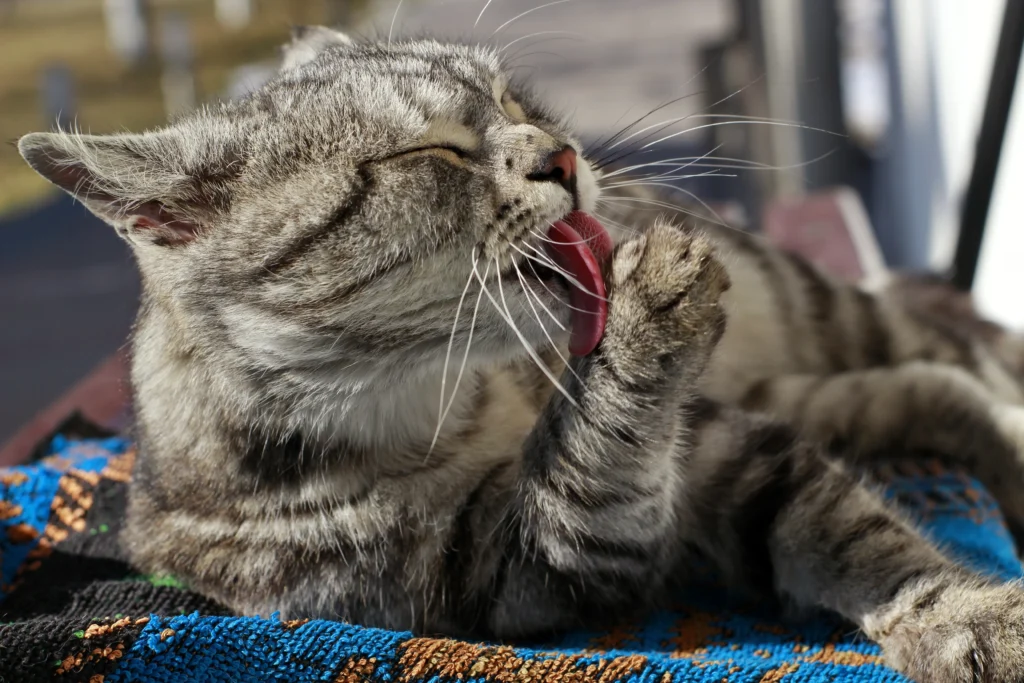
Before we delve into why do cats lick humans, it’s important to understand what makes a cat’s tongue so special. Unlike our smooth human tongues, cats have specialized tongues covered in tiny, backward-facing barbs called papillae. These tiny structures, made of keratin (the same material as human fingernails), create that distinctive rough sensation why cats lick you.
These specialized tongues evolved for several practical purposes:
- Grooming efficiency: The hook-like papillae act like a natural comb, removing dirt, loose fur, and parasites during self-grooming.
- Water consumption: The unique structure helps cats lap up water efficiently.
- Food handling: The rough texture assists in scraping meat from bones and holding prey.
This specialized tongue is essential to understanding cat licking behavior. When your cat turns this powerful grooming tool on you, they’re employing a natural adaptation that serves multiple purposes in their daily lives.
Truth #1: Grooming You Is a Sign of Deep Affection
One of the most heartwarming reasons why cats lick their owners is simple: they consider you family. In feline social structures, mutual grooming (allogrooming) is reserved for cats they trust and care about deeply. When your cat licks you, they are essentially treating you as they would a beloved fellow cat.
“Cats often groom family members and cats they feel comfortable with as a social bonding behavior,” explains Dr. Lisa Radosta, a board-certified veterinary behaviorist. “When your cat grooms you, it’s a sign that they consider you part of their social group.”
This explains why cats groom their owners—it’s their way of strengthening your social bond. In cat communities, this mutual grooming helps establish and maintain social harmony. By grooming you, your cat is:
- Demonstrating trust
- Showing affection
- Reinforcing your bond
- Including you in their “colony”
So the next time you’re wondering why cats lick you so much, remember that it’s often their way of saying “I love you” and “you’re one of us.” This meaning of cat licking is particularly significant, as cats are selective about whom they choose to groom.
Truth #2: Your Taste Is Interesting to Your Cat
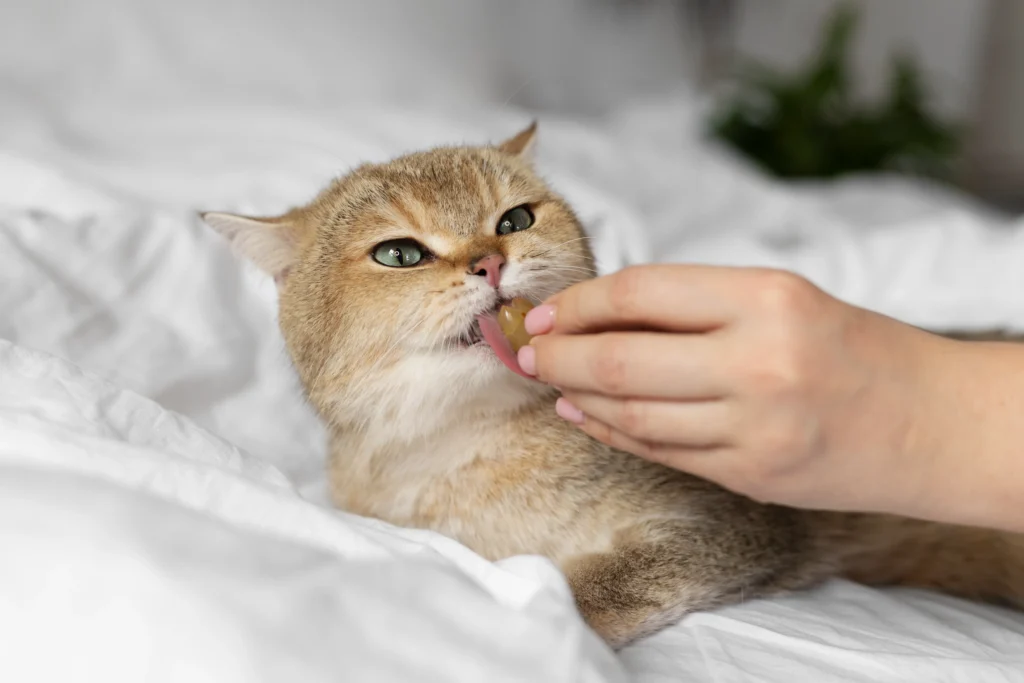
Another surprising answer to why cats lick humans relates to their curious nature and sensitive taste buds. Cats have fewer taste receptors than humans (only about 470 compared to our 9,000), but they have specialized receptors for detecting water, salt, and amino acids.
When cats lick your skin, they may be sampling:
- Salt from your sweat
- Remnants of food or products on your skin
- Your unique personal scent
Many cat owners notice their pets seem particularly interested in licking them after they’ve exercised or come in from outdoors. This is because why cats lick people sometimes comes down to the intriguing taste of salt from perspiration. Your skin contains trace minerals and compounds that might be appealing to your cat’s sensitive taste buds.
If you’re wondering why cats lick you hand specifically, consider what your hands have touched recently. Have you been preparing food? Using lotion? Even the faintest residue might be fascinating to your curious cat. Their powerful sense of smell (14 times stronger than humans) works with their taste receptors to investigate interesting scents they detect on your skin.
Truth #3: It Could Be a Sign of Anxiety or Stress
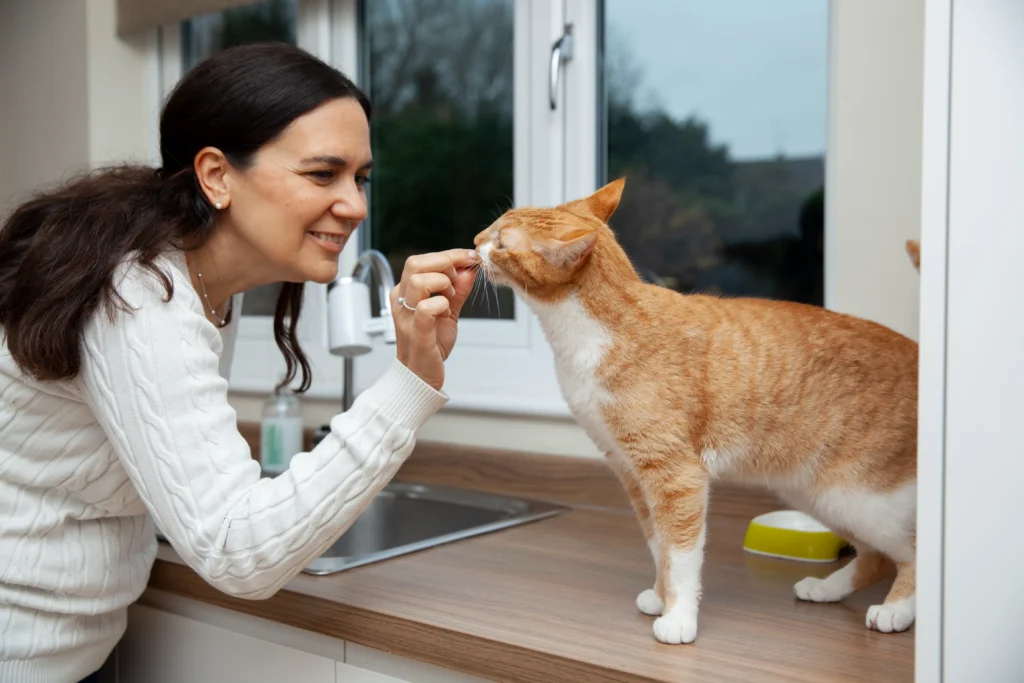
Not all cat licking behavior stems from positive emotions. Sometimes, the answer to why does my cat lick me points to stress or anxiety. Excessive grooming, including licking their humans, can be a self-soothing behavior for cats experiencing psychological distress.
Dr. Nicholas Dodman, Professor Emeritus at Tufts University’s Cummings School of Veterinary Medicine, notes: “Grooming releases endorphins in cats, which are natural painkillers that promote feelings of comfort and relaxation. Some cats may transfer this self-soothing behavior to their owners when feeling anxious.”
Signs that why cats lick you might be stress-related include:
- Increased intensity or frequency of licking
- Licking that seems compulsive or difficult to interrupt
- Accompanying signs of anxiety (hiding, reduced appetite, increased vocalization)
- Changes in normal behavior patterns
If you notice these patterns, consider what might be causing stress in your cat’s environment. Recent changes in the household, new pets, moving, or even rearranged furniture can trigger anxiety in sensitive cats. Understanding this aspect of why cats lick their humans can help you address underlying stress factors and improve your cat’s emotional wellbeing.
Truth #4: Maternal Instincts May Be at Play
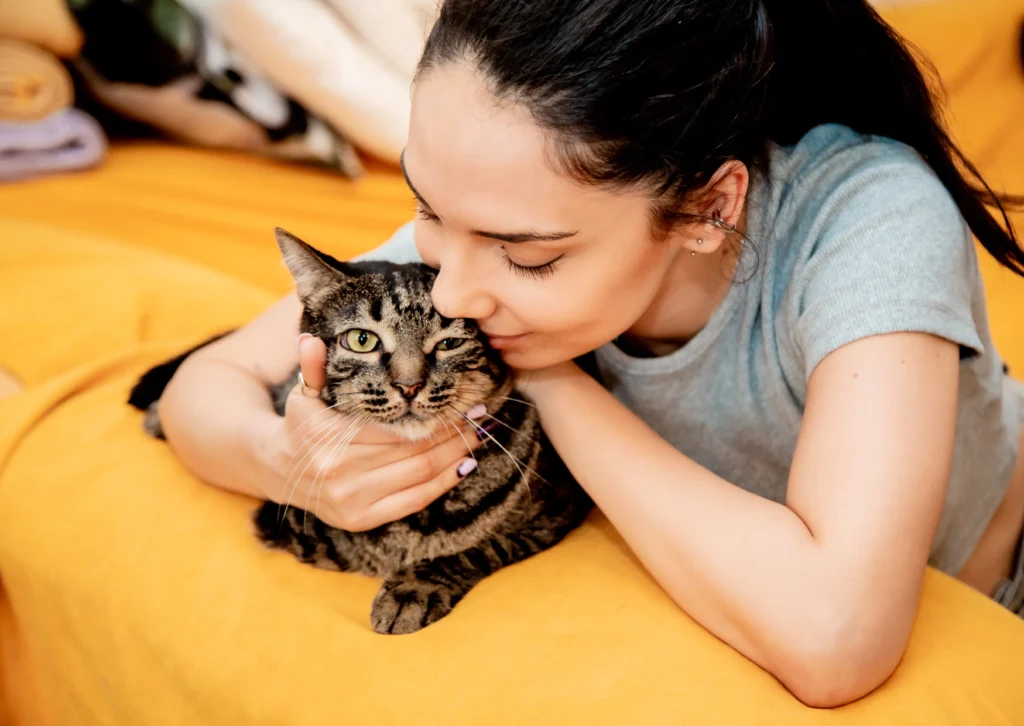
Some fascinating research suggests that one reason why cats lick people might be connected to maternal instincts. Mother cats spend hours fastidiously grooming their kittens—not just to keep them clean, but to stimulate bodily functions and express care.
Female cats (and sometimes males who were weaned too early) may transfer these nurturing behaviors to their human companions. When pondering what does it mean when a cat licks you with particular devotion, you might actually be experiencing your cat’s parental instincts.
Dr. Gary Weitzman, president of the San Diego Humane Society, explains: “For some cats, licking their owners mimics the maternal care they would provide to kittens. It’s their way of nurturing you, which is rather touching when you think about it.”
This maternal aspect of why do cats lick their owners is particularly common in:
- Female cats who have had kittens
- Cats who were orphaned or weaned too early
- Highly nurturing personalities
If your cat seems particularly focused on why cats lick you r face or hair, they might be treating you like a kitten who needs grooming and care. While this might seem amusing, it represents a profound emotional connection between you and your pet.
Truth #5: The Shocking Link Between Licking and Territory Marking
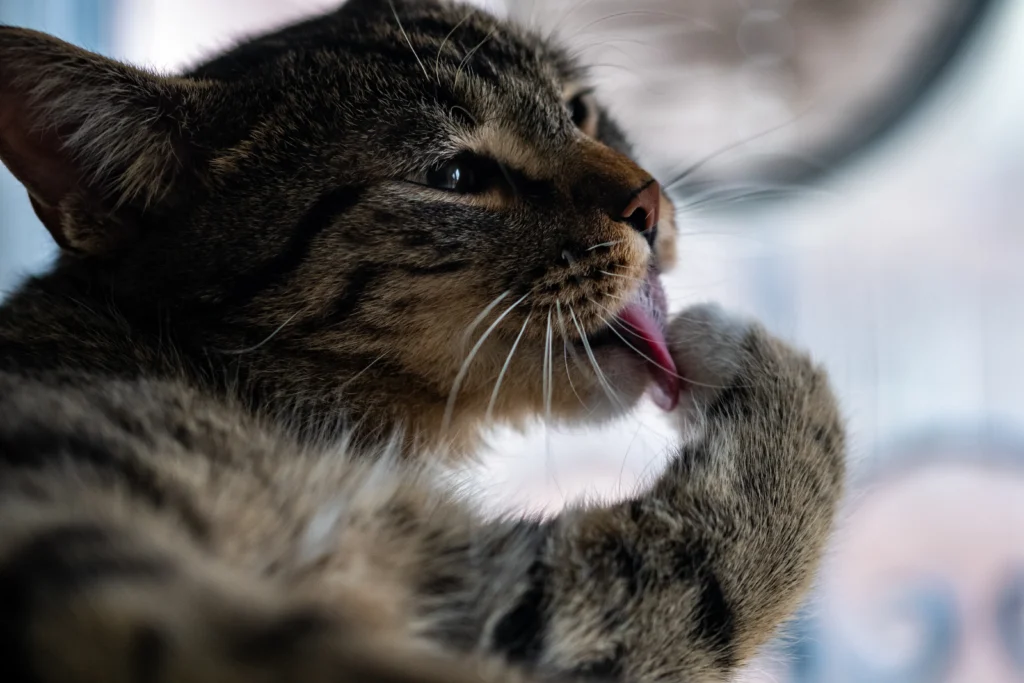
Perhaps the most surprising answer to why cats lick you relates to territory marking. Cats are territorial creatures who use scent marking to establish boundaries and ownership. While we typically associate marking with spraying or rubbing behaviors, licking can also serve this purpose.
When your cat licks you, they’re depositing their scent from glands in their mouth onto your skin. This effectively marks you as “their” human and signals to other animals that you belong to them. This territorial aspect explains why cats lick their humans—they’re essentially stamping you with their personal scent signature.
“Cats have scent glands in various parts of their body, including around their mouth,” explains feline behaviorist Jackson Galaxy. “When they lick you, they’re leaving their scent behind, which is comforting to them and serves as a form of claiming.”
This territorial behavior is particularly evident when:
- A new pet or person enters the household
- Your cat licks you more after you’ve interacted with other animals
- Multiple cats in the home compete for your attention
Understanding this dimension of cat licking behavior helps explain why some cats seem particularly determined to lick their owners after they’ve spent time with other animals or returned from being away.
When Cat Licking Becomes Excessive
While occasional licking is normal and even endearing, some cat owners find themselves asking: why cats lick you so much when the behavior becomes excessive or problematic. Excessive licking might indicate underlying issues that deserve attention.
Is it normal for cats to lick you constantly or obsessively? Generally no—moderation is key with most cat behaviors. Excessive licking could signal:
- Medical issues: Pain, skin conditions, or neurological problems
- Compulsive disorders: Some cats develop obsessive-compulsive behaviors
- Extreme anxiety: Severe stress can manifest as over-grooming of humans and themselves
- Nutritional deficiencies: Sometimes unusual licking stems from dietary needs
If you’re concerned about your cat’s licking habits, consulting with a veterinarian is the best course of action. They can rule out medical causes and provide guidance on behavioral interventions if needed.
The Curious Case of Licking Followed by Biting
Many cat owners have experienced the perplexing behavior where gentle licking suddenly transitions to a sharp nip or bite. Why do cats lick and then bite? This behavior, often called “love biting” or “petting-induced aggression,” has several possible explanations:
- Overstimulation: Your cat becomes overwhelmed by the sensory experience
- Communication boundary: They’re indicating they’ve had enough interaction
- Play behavior: In kittens especially, this mimics natural play sequences with littermates
- Grooming intensity: In cat-to-cat grooming, nipping is sometimes used to remove stubborn debris
Dr. Mikel Delgado, a certified cat behavior consultant, explains: “Cats sometimes use these little nips during social grooming with other cats. When they do it to humans, they’re using the same natural behavior but don’t realize our skin is more sensitive than their thick fur.”
If you’re experiencing this behavior, avoid punishing your cat, as this can damage your bond. Instead, watch for warning signs of overstimulation and respect your cat’s communication by ending grooming sessions before they reach their threshold.
Special Cases: Face and Hair Licking
Some cat owners notice their pets have particular preferences for licking certain areas. If you’ve wondered why cats lick you face or why cats lick your hair specifically, several factors might be at play:
Why Cats Target Your Face:
- Your face has more oil glands, creating interesting tastes
- Your breath carries food scents that intrigue your cat
- Face licking mimics greeting behaviors between bonded cats
- Your face displays more emotion, potentially triggering nurturing responses
Why Cats Focus on Hair:
- Hair products may contain appealing ingredients
- The texture might be satisfying to groom
- Head grooming is a high-priority area in cat-to-cat allogrooming
- Your scalp produces oils that have distinct scents
Dr. Karen Becker, a proactive veterinarian, notes: “When cats focus on grooming specific areas like your face or hair, they’re often drawn to places with the most distinctive scents or the areas that would be prioritized in natural cat grooming hierarchies.”
How to Respond to Your Cat’s Licking
Now that you understand why cats lick people, how should you respond to this behavior? Your reaction depends on your comfort level and the specific circumstances:
When to Encourage Licking:
- When it strengthens your bond
- When it’s part of a calm, positive interaction
- When your cat seems to be expressing affection
- In moderation during cuddle sessions
When to Discourage Licking:
- If it becomes excessive or obsessive
- If it’s uncomfortable or painful for you
- If you have skin sensitivities or allergies
- If the licking seems stress-related
To redirect excessive licking, try:
- Gently moving away without punishment
- Offering interactive toys as an alternative
- Using positive reinforcement when your cat shows appropriate behaviors
- Ensuring your cat has environmental enrichment
Remember, understanding why cats lick their owners helps you respond appropriately to this natural feline behavior.
Cultural and Historical Perspectives on Cat Licking
Throughout history, what does it mean when a cat licks you has been interpreted differently across cultures. In ancient Egypt, where cats were revered, grooming from a cat was considered a blessing. In medieval Europe, however, such close contact with cats was sometimes viewed with suspicion during times of superstition.
Modern perspectives on why do cats lick humans have evolved with our scientific understanding, but cultural interpretations persist. In Japan, for instance, a cat’s grooming behavior toward humans is often seen as a sign of good fortune and protection.
These varying perspectives remind us that cat licking behavior has long fascinated humans across different times and places, reflecting our enduring connection with these mysterious companions.
Ensuring a Healthy Relationship: When Licking Is Concerning
While understanding why cats lick you helps appreciate this behavior, it’s important to know when to be concerned. Excessive licking—of either themselves or you—can sometimes indicate health problems that require veterinary attention.
Warning signs that might warrant a veterinary visit include:
- Sudden increases in licking behavior
- Licking that causes skin irritation (yours or theirs)
- Licking accompanied by other behavioral changes
- Obsessive licking that interrupts normal activities
Dr. Elizabeth Colleran, past president of the American Association of Feline Practitioners, advises: “Any dramatic change in a cat’s normal behavior, including grooming habits, deserves attention. When in doubt, consult with your veterinarian to rule out medical causes.”
Conclusion: Embracing Your Cat’s Natural Expression
Understanding why cats lick you enriches the bond between you and your feline companion. From expressions of affection to territorial marking, this behavior reveals the complex emotional and social lives of our domestic cats.
Next time you feel that sandpaper tongue against your skin, you’ll have insight into whether your cat is showing love, soothing themselves, or simply intrigued by your taste. This knowledge allows you to respond appropriately, strengthening your relationship through mutual understanding.
The question of why cats lick their humans reminds us that even after thousands of years of domestication, our feline friends retain fascinating behaviors that connect them to their wild ancestors while adapting to life alongside humans.
For more information about understanding your cat’s behaviors and building a stronger bond with your feline friend, explore our other articles about cat care, behavior, and health at PetsMemes.com.
FAQs About Why Cats Lick You
Is it normal for cats to lick you?
Yes, it is normal for cats to lick you as part of their natural behavioral repertoire. Licking is a common way cats express affection, mark territory, and engage in social bonding. The frequency varies between individual cats, with some being more enthusiastic “lickers” than others.
Should I let my cat lick me?
Generally, allowing your cat to lick you in moderation strengthens your bond. However, if you have concerns about hygiene or sensitive skin, it’s perfectly fine to gently redirect this behavior. Understanding why do cats lick humans helps you make informed decisions about when to allow or discourage the behavior.
Why does my cat lick me and no one else?
If your cat exclusively licks you, this selectivity speaks volumes about your special relationship. The meaning of cat licking often relates to trust and bonding. Your cat may have formed a stronger attachment to you, or they might prefer your specific scent or taste over others in the household.
Why cats lick your face when you’re sleeping?
Cats may lick your face while you’re sleeping due to the peace and accessibility this time provides. Your still position makes you an easy target, and why cats lick your face often relates to the interesting tastes and scents concentrated there. Some cats also associate your sleeping state with vulnerability, triggering nurturing behaviors.
Can cats transmit diseases through licking?
While cat saliva can contain bacteria, the risk of disease transmission through licking is relatively low for healthy individuals. Cats with certain infections or those who consume raw diets may pose slightly higher risks. People with compromised immune systems should consult their physicians about appropriate precautions regarding cat licking behavior.
Why do some cats lick more than others?
Individual personality, early life experiences, and breed tendencies all influence how much a cat licks. Siamese and Oriental breeds, for example, tend to be more demonstrative in their affection, potentially explaining variations in why cats lick people across different feline personalities.
How can I tell if my cat’s licking is affectionate or stress-related?
Context and accompanying body language provide clues about whether your cat’s licking stems from affection or anxiety. Relaxed posture, purring, and gentle kneading suggest affection, while tense muscles, dilated pupils, or excessive grooming in other contexts may indicate stress is behind why cats lick you.
References and Further Reading
For more information about why cats lick their owners and feline behavior in general, these trusted resources provide valuable insights:
- American Association of Feline Practitioners. (2023). Feline Behavior Guidelines
- Cornell University College of Veterinary Medicine. (2024). Cornell Feline Health Center
- International Cat Care. (2024). Understanding Cat Behavior
- Journal of Feline Medicine and Surgery. (2023). Recent studies on feline grooming behaviors and social bonding.
- The Indoor Pet Initiative, Ohio State University College of Veterinary Medicine. (2024). Environmental Enrichment for Cats
Explore more fascinating insights about your feline friend’s behaviors at PetsMemes.com, where we delve into the mysteries of cat communication, body language, and psychology.
This article was last updated on April 11, 2025, to provide the most current information about feline behavior and grooming patterns.


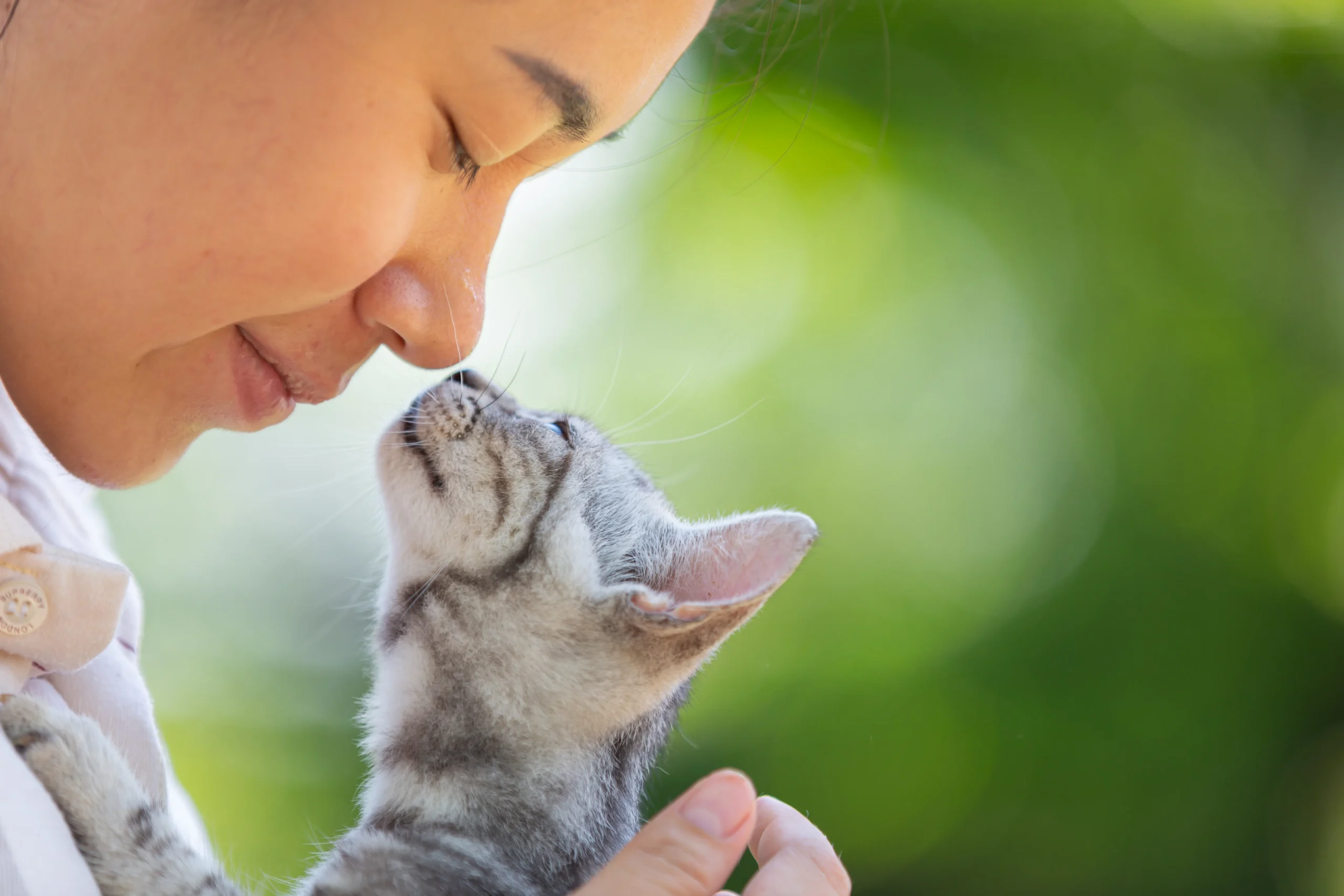


Leave a Comment